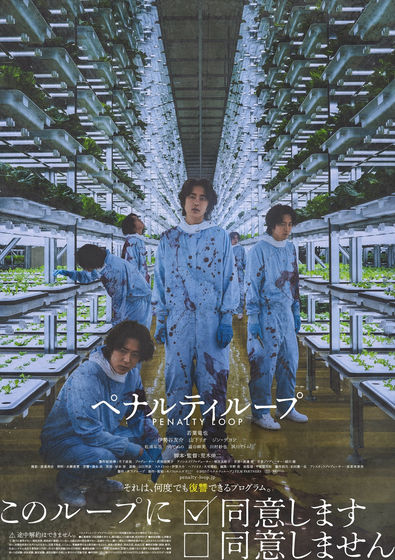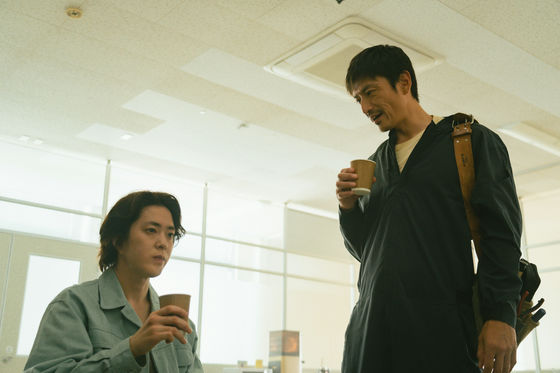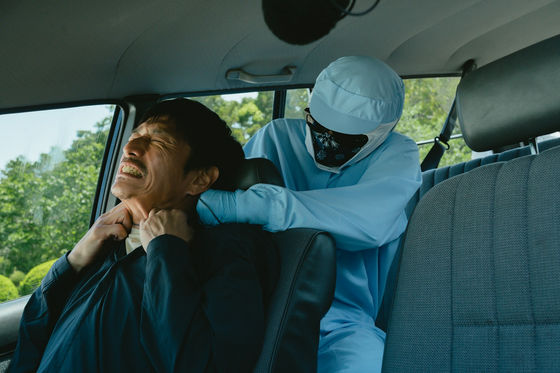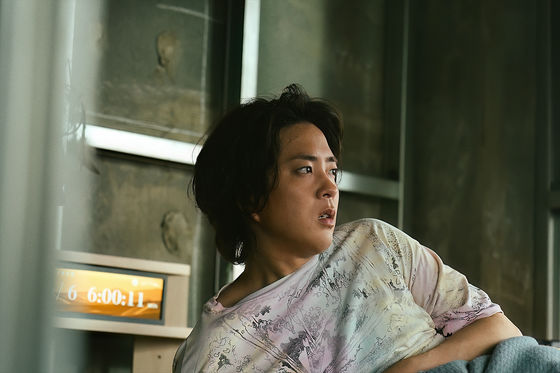Interview with director Shinji Araki of the movie 'Penalty Loop', improving the quality of the work through thorough script development with an eye on production

When you wake up the next morning after killing the man who killed your beloved lover, the situation around you is the same as yesterday, and for some reason the man you killed is still alive, and you end up repeating your revenge... A day of looping revenge. The movie ' Penalty Loop ' based on the movie is being released today, March 22, 2024 (Friday). This is the second film by
Movie “Penalty Loop” trailer | Nationwide release on March 22nd (Friday) - YouTube
GIGAZINE (hereinafter referred to as G):
In an interview published in ``OCEANS'' entitled ` `50-year-old new film director Shinji Araki until he made the hit film ``Ninjin no Machi,' ' he said that while attending a scenario school, he had a change of consciousness and decided to close the school. There was a story that he started writing scripts all the time. Among them, he said, ``About once every two months, sometimes once a month.For the first two years, I didn't make it to the screenwriting competition, but one year, I made it to the first round of the TBS scriptwriting contest. After that, I began to see interesting results.''I think there was a breakthrough, but did anything change in Mr. Araki at this time? Or did you change something?
Director Shinji Araki (hereinafter referred to as Araki):
I think maybe some aliens hacked it and messed with it (lol).
G:
(lol)
Araki:
At first, I really didn't get caught up in it at all, and there were days when I wondered if aliens would actually come. Once I started getting involved in prizes, to be honest, I was able to win prize money and it was fun. Well, more than money, as anyone who has ever written a screenplay or novel by themselves will know, it's really rare to have someone take what you've written seriously. I was very grateful that the award was open to the public, so I wrote it down anyway, implying that the deadline for the open call was the deadline for the requested manuscript (lol).
G:
Is it a hint? (lol)
Araki:
At first, even your relatives and friends will read what you write. But it's really hard to read, so I gradually start to think, 'That's enough...' (lol) Around that time, the rush to win prizes started (lol) Sometimes I talk to people who are recruiting screenplays and novels. However, they say, ``I just have to keep writing and applying.'' I really think so. There's nothing more boring than saying, ``I wrote one or two books with all my heart,'' and I think there's probably an answer to that next one, and then the next one.
G:
There was a time when you were applying for one movie every month to one every two months, but how fast were you writing the script?
Araki:
I make an outline first, then do the beginning, development, conclusion, and box writing, and then the actual writing time is 1 or 2 days if it's 60 minutes. I used to think that if I couldn't write at that level, it would be no good. However, even though I'm supposed to have decided on an outline and written everything, as I'm writing, something suddenly pops up that I didn't plan on. For example, even though I had decided to eat an apple, my brain suddenly goes into overdrive and says, ``Throw the apple.'' This happens all of a sudden, but it feels really good (lol)
G:
(lol)
Araki:
I'm sure there are runners out there who decide on a course for each day, ``I'm going to run here,'' but then suddenly something flips and they end up going somewhere that isn't the course. This ``turning of a switch'' feels good, and whether or not what comes out here is interesting as a script is another matter, but it feels so good that it keeps me in a good mood all day long. ...For some reason, this also deviates from the answer to the question, doesn't it?
G:
No, it's okay. In his previous work, ``Number of People'', he worked with the producer and others to flesh out the script, spending about 3 hours at a time, and continued for about 8 months, resulting in 18 drafts of the script. How was the development of the work?
'Number of People' 60 seconds trailer - YouTube
Araki:
Don't you think that if you try something like this once, you'll get better at it?
G:
Yes, I feel that way.
Araki:
This time, it took about 28 drafts to develop the preliminary draft and 22 drafts to finalize. When it came time to finalize the draft, I had the assistant director and producer fully involved with me, and I remember working on it for about 4 hours each time, but when I looked back at my notebook, it turned out to be 7 to 8 hours (lol).
G:
(lol)
Araki:
In the case of ``A Town of Numbers,'' we had a script, but when we actually looked into it, we realized that we couldn't shoot it exactly as we had written, so we ended up cutting out some parts. That can't be helped, because it's convenient for time and budget. However, for this film, I was able to check that part during the development stage of the final draft, so I was able to shoot almost exactly what I had written as a script. Screenplays are written with the whole thing in mind, so if even one part is cut out, the calculations will be greatly off. With this style, that doesn't happen, so even though it was a long time, it was a very meaningful and efficient use of time.
G:
Regarding casting, including the staff, he said in a past interview, ``Once you start shooting, there are so many things you can't control.What I realized this time is how much you can talk to the director of photography and the actors before you start shooting. , how important it is to be able to pass along effective notes.''In the case of this game, it feels like they were actively taking the time to develop this game, in addition to the development you just mentioned. Is it?
Araki:
Well, I wanted to hear from the staff, so I had a meeting after the script was written, and I also had a lot of art meetings. This time, art is quite a key part of the movie, so we all discuss what kind of art will appear from the head to the buttocks. When we're talking about things like, ``Maybe this is better than this?'', we don't just accept opinions and ideas as they are; we also ask, ``Here's another new idea, what do you think about this?'' He hits them over the head. Then, we also say things like, ``I had no idea, but that's good,'' or ``It's exactly what I thought, but it turns out it wasn't that good.'' Well, in any case, it's a back and forth conversation.
G:
Oh, that's nice.
Araki:
The costumes were similar. I really like the feeling of colliding each other's creativity, and I think that the only thing that makes movies interesting is collaboration. There is a director in charge, but it doesn't mean that he takes in everything; in fact, when I have him give me opinions like that, I'm shocked at how narrow my field is (lol). 'I can't shoot it myself, but objectively I think it's good, so I think you should ask another director to do it' (lol)
G:
(lol)
Araki:
But it's really interesting to hear all sorts of things thrown at you like that, and when you create something, especially when it comes to video work, you rarely do it alone, so this way you can share your opinions with other people. I think it's interesting that we can create works by collaborating with each other.
G:
In this work, ``Penalty Loop,'' a hydroponic cultivation factory appears, as shown in the poster. Why did you choose to set the stage in a hydroponic cultivation factory?

Araki:
This time, the story is a loop in which Iwamori, whose beloved lover was killed, kills his enemy, Mizoguchi, and when he wakes up the next morning, Mizoguchi has come back to life, so he kills him again. In that case, you can prepare just one white room, for example. Every morning when he wakes up, Mizoguchi is next to him, so he says he's going to kill him. However, I thought that if there was no reality of life involved, it wouldn't be revenge. Therefore, labor was established as the center of life. The idea was to ``kill the enemies that come to the work site.'' I thought it was easy to understand the factory as a work site.

G:
Ah, I see.
Araki:
At first, I was imagining something more authentic and classic, like making cosmetics or anything else, but like doing assembly line work. However, when I investigated, I found out that there are actually surprisingly few such factories in Japan. Just as I was thinking, ``Perhaps the factory I'm thinking of is old-fashioned,'' I received information from art expert Ryo Sugimoto, who said, ``Hydroponic cultivation was interesting,'' and when I actually looked at it, it turned out to be very interesting. This is a place where humans have complete control over the life and death of the vegetables, and we grow the lettuce used in convenience store sandwiches.There are no insects, so there are no complaints about contamination. I thought it was a modern landscape...Also, I thought it would be possible to incorporate some of the tricks from the work into the design.
G:
Hmmm.
Araki:
Green is also the theme color, so I got carried away and even made the poster into a hydroponic cultivation factory (lol)
G:
So it's a poster (lol)
Araki:
I wouldn't say it's such a key location, though.
G:
By the way, is that hydroponic cultivation factory real? When I was watching it, I thought it was extremely realistic for a set.
Araki:
It would be cheaper to rent something than make it, so all the staff members came wearing dust-proof clothing and took the photo. It's actually a hydroponic cultivation factory in Fukushima Prefecture, and since it's automated, there aren't many people inside the factory, just a few people checking it out. It feels like the future.
G:
It actually exists...it's amazing.
Araki:
Just because it's a hydroponic cultivation factory doesn't mean it can be produced extremely cheaply, but considering the global situation, I feel that it will continue to grow in the future.
G:
After watching two of the director's works in a row, there was a scene where they both signed a contract, and I wondered if you had any thoughts on such contracts. What do you think? Is it just a coincidence?
Araki:
It wasn't included in the first script, but I feel like I'm 'agreeing' to something every day. There are some things you've never even read inside. In this work, Iwamori, who had signed a contract, thought about how to express this in an easy-to-understand way when he found himself unable to turn back now, and wrote the contract. However, the other day, when I asked a Chinese person to look at it, he said, ``It was really interesting, but I've never seen a paper contract before.'' (laughs)
G:
(lol)
Araki:
Well, I thought, if it wasn't a paper contract, it wouldn't have any weight. But really, we agree on something repeatedly every day, even when we install an app. I never really consented to it, and I live with great doubts about the memorandum and the fact that it was still part of the contract even though no one read it.
G:
There are many interviews with Araki on the internet, but one
Araki:
For example, if you are a student, this is natural. If I ask my friends to film it, the director and scriptwriter will pay for it. Maybe there will be someone to play the lead role as well. I think it's good. I think it's totally fine if you're an adult and doing it as a hobby. What bothers me a little is that this kind of independent funding, or even more so, having people work for free, has spread to movies that are shown in theaters.
G:
There has to be a line drawn.
Araki:
Approximately 600 movies are made in Japan every year. I think there are many. The number is about who will see it. Of these, I think only a very limited number of works are viable as businesses. Therefore, it is only natural that such taking-out and unpaid labor occur. From the perspective of the people involved, it would be rather gratifying to see a movie that they voluntarily paid for or worked for free play in theaters.
G:
I see, that's so.
Araki:
I think it's totally fine if you consider it as an investment when you put out the money. It seems that American actor Burt Lancaster noticed this early on and actively invested in and owned the rights to the movies he appeared in.
I've been given great opportunities, and I've been able to make two films with money from Kino Films. If I hadn't gotten this chance, I might have managed to raise my own funds and make the film.
For example, in Scandinavia, there is a system in which the country pays generously for films that go through a strict screening process. It's the opposite of Japan. However, this is a soil issue, so I don't think it's a matter of which is better.
G:
In the same interview, he said, ``For example, if I say I'm going to work hard to raise money and make a movie for 10 million, isn't that just making a movie for 10 million?But Kino Films says they'll give me 50 million. You said, ``If you convert their knowledge and connections into fees, you can do things that you can't do with that budget, even if it's not that great.'' When did you feel that kind of ``knowledge and connections''?
Araki:
I feel it all the time. The experience gained by the producers who worked with us on development is a great source of knowledge. The connections that allow us to gather staff together are also amazing. I am currently being interviewed like this, and that is all due to my knowledge and connections. Even if you only have the money, you don't know what to do to prepare for the movie's release. The 50 million yen provided by Kino Films in that story refers to the production costs for the first film, but I am aware that they are investing more than that amount. When you think about it this way, being a movie director may be a job that you can do without any experience as long as you have talent, but I feel that being a producer absolutely requires experience. He gave me advice like ``Araki-san's movie should be done that way,'' or ``If you do it this way, the whole thing will fall apart,'' and I thought he had a great sense of smell. I only work with Kino Films, so I don't know what would happen with other companies, but at least if I spent the same amount of money making a movie myself, I'm sure it would be terrible (lol)
G:
Furthermore, in the same interview, he said, ``If I were to seriously answer the question, ``How did you manage to take this photo?'', I guess it would mean that I didn't try to do it the way I knew how.'' ``I just kept asking questions to the staff around me,'' and ``I completely realized on set that this person is a person who listens a lot.'' Did you find the etiquette you learned useful for your second film?
Araki:
It was really troubling. Since Uno writes articles like this, it becomes obvious that ``this guy pretended not to know, said he didn't understand, and relied on us.'' I really feel like, ``That's a really well written thing...'' (lol)
G:
(lol)
Araki:
As for my personality, I'm ambitious in a good sense...and in a bad way, I get bored easily (lol), so I don't think of doing the same thing at all. It would be foolish to waste time trying to repeat something that was successful, so I thought I should try something I've never done before.
G:
I see, i see. It's challenging.
Araki:
There was a car scene in the previous movie, but it took a really long time. If we're talking in a conference room, the cameraman will quickly set things up and we'll move on with the performance and think, ``This is what it's going to be like.'' But in a car, it's just setting up the filming equipment and doing this and that. Since there are so many things to do, just setting them up can be exhausting. I thought about not doing car scenes, but if you think about it carefully, cars are interesting items, and they integrate movement and the passage of time, so that alone makes it very cinematic. So, just like Gyakugire, we put both of them in a car and increased the number of car scenes.

G:
Amazing (lol)
Araki:
I love setting traps for myself like that, and I haven't done judo or kendo in my life, nor have I ever hit anyone, but this time I decided to make a work that is all about action. I wonder how to film it, so I consult with the action director, but since the action director is an action director, he suggests great action scenes, but he then applies them to the actors and decides whether it's okay or not, and what they want to do better. In the end, it's up to you. You need to be prepared to say that you absolutely want to do this.
G:
That's a cool resolution.
Araki:
It's cool, but it's difficult. However, I think most film directors have to say with certainty that this is what they want to do. Continuing from what I said earlier, if you decide that you want the action to look like this, you'll have to face one problem after another, such as what angle to shoot it from, or if you can't do it this way because it's inside a car. In the end, you have no choice but to ask the cameraman, assistant director, and action director all the time. All you can do is keep listening and learning.
In the end, I don't really feel like I'm used to it just because it's my second time, and most of the staff and cast are new to me. As for the staff, other than Mr. Sugimoto, the art director, everyone is new to the project, and the only cast members who are returning are Saya Kawamura and Yuya Matsuura. Of course, there were some scheduling issues, but halfway through I thought it would be nice to do something like that. How much can you do in 'Nice to meet you'? There's no such thing as saying, 'It's an easy win because it's the second one.' Tomoya Nakamura from the first film and Tatsuya Wakaba from this film are both great actors, but of course they are completely different. What they do is completely different. It's not 'good or bad,' it's just that they are different because they are different people. It's obvious, isn't it? If the script is 'development,' production is like 'exploration.'

Araki:
But this is fun. I have to make sure that I am photographing what I want while receiving various opinions and getting mixed up in various situations, which is bliss.
G:
This time, after watching ``Penalty Loop,'' I went to see his previous work, ``A Town of Numbers,'' and while his previous work was amazing, this was an overwhelming work that surprised me considering it was the director's second work. The level of everything has risen dramatically...
Araki:
thank you. At the preview, only my juniors at work, juniors from my school days, and for some reason only my juniors said, ``You've gotten better.'' For some reason, my juniors say to me from above, 'Araki-san, you've gotten better' (lol)
G:
(Laughs) As Mr. Araki, are there any areas that you feel could have been improved?
Araki: 1
Of course, there was an accumulation of small details. Things I did wrong in the first film, things that happened because I didn't ask certain questions beforehand, time management, etc. But the biggest thing was the 'development' of the script, which took seven hours at a time. It was a big deal to be able to properly write the blueprint. There are no scenes in this film that were 'necessary but couldn't be shot.'
G:
oh.
Araki:
Regardless of whether the script is good or bad, I think the quality is directly related to whether the script can be written with production in mind. I worked hard on the script for the previous film, but I don't think I was able to imagine the actual production as much as I did this time.
G:
I see. Thank you for explaining in detail.
Araki:
thank you very much.
The movie 'Penalty Loop' will be released nationwide from Friday, March 22, 2024 at Shinjuku Musashinokan, Ikebukuro Cinema Rosa, and other theaters.
Special video for the movie 'Penalty Loop' | Nationwide release on Friday, March 22nd - YouTube
◆Movie 'Penalty Loop' information
Ryuya Wakaba
Yusuke Iseya Rio Yamashita Jin Dae Young
Yuya Matsuura, Asami Shibuya, Saya Kawamura, Atom Shukugawa
Screenplay and Director: Shinji Araki
Executive producer: Naoya Kinoshita
Producer: Yumiko Takebe
Associate Producer: Yukiko Shii
Music: Takashi Watanabe
Music producer: Toru Midorikawa
Photo: Watanabe Toshitake
Lighting: Takahiro Minase
Sound: Huang Yongchang
Art: Ryo Sugimoto
Decoration: Kunihiko Yamakawa
Stylist: Daisuke Iga
Hair and makeup: Rie Oya
Edited by: Hayano Ryo
Assistant Director: Seitaro Kai
Production Manager: Kenichi Matsuda
Assistant Producer: Kanae Zakimi
Produced by Kinoshita Group
Produced and distributed by Kino Films
Running time: 99 minutes
© 2023『ペナルティループ』FILM PARTNERS
Related Posts:







